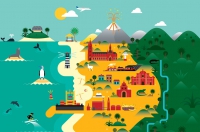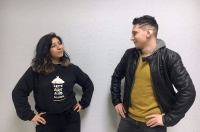Growing up in Palestine has unique challenges. While access to higher education is readily available, the turmoil of living there puts a lot of pressure and stress on the local inhabitants, especially on young people. But the hardest part of all, especially for Motasem, who was living in the troubled region of Gaza, is that the opportunities to go in and out of the country are very limited as the borders are open for several days each year, at most.
Motasem completed his Bachelor’s degree in Information Technology at Al-Azhar University in Gaza, and Master’s degree in the same field at the Islamic University of Gaza. While working in IT, he spent about three years painstakingly looking for scholarships around the world for further study, particularly in Russia, India and China. Due to the sheer impossibility of crossing the border and the long wait, he missed his chance to participate in those. At one point he found an opportunity to go to Italy to complete a PhD program in artificial intelligence in humanities, which he was inspired to do after his best friend committed suicide due to the enormous stress and hardships of his life in the conflict-ridden region. Unfortunately, this opportunity also didn’t work out.
He was first attracted to the Open Doors scholarship when he saw the option to study his favorite topic of Intelligent Systems in Humanities. “I need to do something for the humankind,” he says, and this looked like a good start to fulfilling his life-long dream. Eventually he enrolled in a double degree program on information security. This means that after his first year at ITMO, he has the opportunity to spend his next year at a university in Finland. He was encouraged to take this degree because of the outstanding expertise Russian programmers have in this field: Motasem admits that he wants to learn from the best. “I am thinking to mix artificial intelligence with information security to get the perfect balance,” he adds.

The Open Doors scholarship winners are selected based on a rigorous round of challenging competition exams. Motasem prepared by recapping on his earlier studies, and looking online at Russian forums. “It was my first time doing an exam like this, using a programming language in a complex online framework with strict regulations,” he shared.
He was also impressed that this scholarship was not like others he had encountered in terms of the amount of support participants were receiving, “I found that this scholarship program was serious. I was getting regular responses to my questions and I realized it was a far cry from other scholarships where organizers usually just brush you off,” says Motasem.
Looking into the scholarship project, he found out that ITMO University was one of the principle organizers. After doing some research online, especially on Quora, he discovered that it has a great reputation in the international programming community, which decided his choice to go for ITMO.
In May of this year, he got the long-awaited news that he was accepted to the program, which was all the more exciting given that at the time the border between Gaza and Egypt was open. Overjoyed, Motasem quickly packed his bags and prepared to leave Palestine as fast as he could, even though he hadn’t yet received his invitation for a Russian student visa. “I didn’t want to risk missing any of my studies so I decided to wait in Egypt for a few months and apply for my visa there.”
As soon as he got his invitation three months later, he made his way to the Russian embassy in Cairo. He explained his story at his visa interview and obtained his visa on the same day. Two days after that he was in St. Petersburg, arriving just in time for the start of the first semester.
“I am in awe of this city: it’s an amazing place. Everyone knows I am in St. Petersburg and they’re constantly nagging me to go visit museums, but I’m just enjoying my time for now. When I get a break from studies, I just walk around, look at the nature, and the people, they are so kind to me. I haven’t had any issues with prejudice or racism; on the contrary, there is a lot of respect for me.”
When asked about his plans for the future, Motasem says that for now, he just wants to take life as it comes. “I’m not sure what will happen in the near future, but for now I will focus on my degree and maybe possibly continue with a PhD, or work – I see a world of opportunities before me.”




